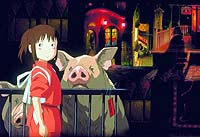Spirited Away
Spirited Away, or Sen to Chihiro no Kamikakushi (千と千尋の神隠し; "The spiriting away of Sen and Chihiro") is a 2001 Studio Ghibli movie by Japanese anime director and manga artist Hayao Miyazaki. more...
The film won the Oscar for Best Animated Feature Film at the 75th Annual Academy Awards ceremony in 2003, making the film the first anime production to receive an Oscar. Other animation awards came from the National Board of Review of Motion Pictures, the Los Angeles Film Critics Association and the New York Film Critics Circle. It shared Golden Bear at the 2002 Berlin Film Festival with Paul Greengrass' Bloody Sunday, becoming the first animated film to win that award. The film also made it to dozens of top ten lists by American critics in 2002.
Spirited Away was released in Japan in July 2001, drawing an audience of around 23 million and revenues of 30 billion yen (approx. $250 million US), to become the highest-grossing film in Japanese history (beating Titanic (1997)); it is said that by 2002, a sixth of the Japanese population had seen it.
The film was subsequently released in the United States in September 20, 2002 and made slightly over 10 million dollars by September 2003. It was dubbed into English by The Walt Disney Company, under the supervision of Pixar vice president John Lasseter, and was released in North America by its Buena Vista Distribution arm. It was released in the United States in DVD format on April 15, 2003 where the attention brought by the Oscar win made the title a strong seller. The English-dubbed version was also released in the UK on March 29, 2004.
Hayao Miyazaki, the director of My Neighbor Totoro (1988) and Princess Mononoke (1997) as well, came out of retirement to make this film after meeting the daughter of a friend, on whom the main character is based.
Story
In the movie, Chihiro Ogino is a little girl who is moving to a new town with her parents, Akio and Yuko (Yūko). She is clearly unhappy about the move and appears rather petulant. They lose their way and come across a tunnel, and out of curiosity enter it, unaware that it actually provides access into a spirit world—specifically, to a spirit bathhouse, where the spirits and gods (drawn from the Shinto religious tradition) go to rest and relax. The family enters what is apparently an abandoned theme park populated with restaurants, and Chihiro's parents, finding a place to eat, immediately help themselves to a meal. Chihiro is uneasy, and hesitates outside, watching her parents eat like pigs; soon they actually transform into large pigs (as happened to Odysseus's crew in Homer's Odyssey).
When Chihiro's distress at losing her parents is compounded by discovering that she's turning transparent, a mysterious boy or young man named Haku comforts her and gives her something to eat which turns her solid again. He then escorts her into the spirit world palace of Yubaba (Yubaaba) and admonishes her that the only way she can remain safely for long enough to rescue her parents is to find work in the spirits' bathhouse.
Chihiro follows Haku's advice, descending a long outdoor staircase to the boiler room where she asks the human-looking, six-armed boilerman, Kamaji, for work. He rebuffs her, until one of the coal-carrying sprites (reminiscent of My Neighbor Totoro's soot sprites) collapses under an extra-heavy lump. Chihiro takes the sprite's place and feeds the boiler. Kamaji warms towards the girl, and assists her getting a job in the bathhouse.
A young woman named Lin (Rin) helps Chihiro find her way through the labyrinthine palace undetected, diverting a fellow servant by tantalizing him with food while Chihiro squeezes into an elevator behind a gross but benign radish spirit (daikon kami).
Pulled into Yubaba's penthouse suite, Chihiro discovers a regal but monstrous lady (similar to the Duchess in Alice's Adventures in Wonderland), who dotes on an equally monstrous (and unfeasibly large) baby. Chihiro repeatedly and stubbornly asks for a job, and finally Yubaba consents, on condition that she give up her name (somewhat like the Sea Witch demanding The Little Mermaid's voice in the Hans Christian Andersen tale). Yubaba literally takes possession of Chihiro's name, grasping the kanji from the contract in her hand and leaving Chihiro only one piece of her original 2-character name on the contract, in isolation pronounced "Sen". By taking someone's name, Yubaba keeps the owner of the name a prisoner of the bathhouse forever—unless she or he can remember who she or he is.
Read more at Wikipedia.org



